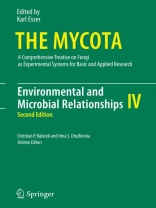After the publication of Volume IV in 1997, the introduction of molecular methods into ecology led to significant new findings. Emphasizing these advances, the chapters for the second edition have been completely updated and revised. This volume provides insight into current research on fungal populations and communities. It focuses on fungal responses to the physical environment, interactions with other fungi, microorganisms and invertebrates, the role of fungi in ecosystem processes such as decomposition and nutrient cycling, and aspects of biogeography and conservation. Several chapters deal with various applications in, e.g. biological pest control, natural products discovery, and the degradation of toxic organic compounds. This is an invaluable source of information both for scientists who wish to update their knowledge of current progress and for graduate students interested in obtaining a first overview of this field of research.
Innehållsförteckning
Life History and Genetic Strategies.- Evolutionary Ecology of the First Fungi.- Molecular Approaches for Studying Fungi in the Environment.- Determinants of Fungal Communities.- Disturbance in Natural Ecosystems: Scaling from Fungal Diversity to Ecosystem Functioning.- Fungal Responses to Disturbance: Agriculture and Forestry.- Fungi and Industrial Pollutants.- Fungi in Extreme Environments.- Biogeography and Conservation.- Fungal Interactions and Biological Control Strategies.- Plant Disease Biocontrol and Induced Resistance via Fungal Mycoparasites.- Antagonism of Plant Parasitic Nematodes by Fungi.- Entomopathogenic Fungi and Their Role in Pest Control.- Bacterial Weapons of Fungal Destruction: Phyllosphere-Targeted Biological Control of Plant Diseases, with Emphasis on Sclerotinia Stem Rot and Blackleg Diseases in Canola (Brassica napus L.).- Effects of Animals Grazing on Fungi.- Fungal Endophytes.- Mycorrhizal Fungi: Their Habitats and Nutritional Strategies.- Applications of Fungal Ecology in the Search for New Bioactive Natural Products.- Decomposition, Biomass and Industrial Applications.- Nutrient Cycling by Saprotrophic Fungi in Terrestrial Habitats.- Fungal Decomposers of Plant Litter in Aquatic Ecosystems.- Degradation of Plant Cell Wall Polymers by Fungi.












